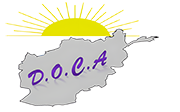Our Strategy
At DOCA, our strategy is rooted in a holistic and participatory approach that empowers communities, fosters collaboration, and addresses the multifaceted challenges facing Afghanistan. Our strategic approach encompasses the following key elements:
-
Community-Cantered Development: We prioritize a bottom-up approach that centers on community participation, engagement, and ownership. By partnering with local stakeholders, including community-based organizations and grassroots networks, we ensure that our interventions are contextually relevant, culturally sensitive, and responsive to the needs and aspirations of Afghan communities.
- Integrated Programming: DOCA adopts an integrated approach to programming, recognizing the interconnectedness of health, education, capacity building, human rights, nutrition, emergency response, protection, research, and other key areas. By addressing these issues comprehensively and holistically, we maximize our impact and create synergies that drive sustainable development outcomes.
- Empowerment and Capacity Building: We prioritize empowerment and capacity building as core strategies for sustainable development. Through targeted interventions, training programs, and skills development initiatives, we empower individuals and communities to take control of their own development, build resilience, and drive positive change from within.
- Partnerships and Collaboration: Collaboration is central to our approach. DOCA actively seeks partnerships with government agencies, civil society organizations, donors, and other stakeholders to leverage resources, expertise, and networks. By fostering strategic alliances and multi-stakeholder partnerships, we amplify our impact and achieve greater collective outcomes.
- Advocacy and Policy Engagement: DOCA advocates for policy reforms and systemic changes that promote social justice, human rights, and inclusive development. Through targeted advocacy campaigns, research, and policy analysis, we engage with policymakers, government institutions, and international partners to influence decision-making processes and drive positive change at the national and local levels.
- Emergency Preparedness and Response: Recognizing the importance of resilience and preparedness in the face of emergencies, DOCA prioritizes emergency response and disaster risk reduction initiatives. We work proactively to strengthen community resilience, build disaster-resistant infrastructure, and provide timely and effective humanitarian assistance to communities affected by conflicts, natural disasters, and other crises.
- Research and Learning: DOCA invests in research, monitoring, and evaluation to inform evidence-based programming, drive innovation, and enhance learning. Through rigorous data collection, analysis, and knowledge sharing, we continuously adapt and improve our interventions, contributing to the evidence base for effective development practices in Afghanistan.
- Gender Equality and Social Inclusion: Gender equality and social inclusion are cross-cutting priorities in all our activities. DOCA promotes the rights and agency of women, girls, and marginalized groups, mainstreaming gender considerations and ensuring their meaningful participation in decision-making processes and development initiatives.
- Ethical Principles and Accountability: DOCA upholds the highest ethical standards and principles of accountability in all its operations. We are committed to transparency, integrity, and responsible stewardship of resources, ensuring that our actions are guided by ethical considerations and respect for human dignity.
- Innovation and Adaptation: DOCA embraces innovation and adaptability as essential drivers of change and progress. We continuously seek new ideas, approaches, and technologies to address emerging challenges and seize opportunities for transformative impact, fostering a culture of learning, experimentation, and continuous improvement.
